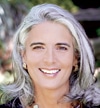by Maria Sirois
One of my earliest sets of memories as a presenter is captured in this Anne Lamott quote: “Sometimes my mind is a bad neighborhood I try not to go into alone.”
After every workshop or lecture in my first few years, I would be tortured about what hadn’t gone well or how I had messed up. The night that I brought everyone to tears during a workshop on stress reduction, I felt great about my ability to move an audience—until one participant told me in the parking lot afterward that I should try to help people feel less stressed, not just powerfully aware of how awful their stress was. That one sticks with me to this day.
I agonized for weeks about that night. Our minds are not only hardwired for anxiety and fear, they (if you are at all like me) seem to be brilliant at rumination, torture, and self-blame. If this is true for some of us as presenters, it is also true for those in the audience. A question I now live with is this: How can I teach my audiences to move toward a sense of themselves as whole, even as they experience themselves as broken? And, even more directly: How can I live into that knowing from the front of the room, even as I know myself to be ruminative at times, vulnerable, and imperfect in my teaching?
These questions, compelling and not simple, cannot begin to be answered until we learn to live into paradox—which the best teachers, the most skilled presenters, understand and model. Living into paradox means having the ability to hold seeming opposites, to recognize and honor that tension. I am moving toward wholeness and I am aware of my fragility. I ruminate constantly and my mind is also my friend. We did not do this well and we are capable of bringing the best of ourselves alive. When we can hold both sides of an “and” statement that recognizes the negative and the positive—or the potential positive—we are living into paradox.
As presenters, we enable our students to move in this direction by first appreciating our own capacity for wholeness. The root of the word “whole” comes from stems that signal health or peace. We are whole when we are healthy or in a state of peace and serenity. When we can honor this wholeness within ourselves, while also acknowledging the aspects that are not quite at peace or in health, we move toward a paradox that is sustaining.
For example, as I teach, I sometimes find myself nodding yes when an audience member asks if I am familiar with a particular article or research study—even if I’m not. I move toward wholeness within myself when I can respect the essential parts of me that tell the truth and act with integrity, while at the same time recognizing the lack of truth in nodding yes. I teach toward wholeness when I can use that very moment of lying to step back, name it out loud in the room, and invite others to notice how being incomplete, unwhole, in this one way, does not negate my essential integrity.
This is the depth of learning available through Teaching for Transformation. At one level, we consider what is important in positive transformation: moving toward a sense of wholeness. At the next level, we consider it within ourselves: How are we living into the paradox of wholeness and imperfection? And, at a third level, we bring this wisdom to the very act of teaching itself: How can I bring this wisdom alive in the room?
Find out about Maria’s Teaching for Transformation course, beginning January 16.
Dr. Maria Sirois, PsyD, is the Vice President of Curriculum at Wholebeing Institute and an inspirational speaker, seminar leader, and author who has worked at the intersections of wellness, psychology, and spirituality for nearly 20 years. As a wellness guide, Maria has been invited to keynote throughout the country at conferences for wellness centers, hospitals, hospices, and philanthropy, business, academic, and corporate institutions, as well as for the general public. She has been called a “true teacher” and “an orator of great power and beauty.” She is the author of “A Short Course in Happiness After Loss (And Other Dark, Difficult Times)” and “Every Day Counts: Lessons in Love, Faith, and Resilience from Children Facing Illness”.










